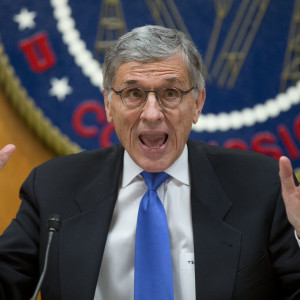Federal Communications Commission Chairman Tom Wheeler took the stage at the 2016 Consumer Electronics Show in Las Vegas Wednesday to discuss big issues before the FCC this year, including the spectrum incentive auction, reflect on victories including net neutrality and thank comedian John Oliver for furthering the debate.
“John Oliver took the ultimate arcane issue, Title II, and made it something that got people interested. And that’s good,” Wheeler said of the host of HBO’s “Last Week Tonight,” who during an episode of the satirical news show discussing net neutrality in 2014 that went viral, likened putting Wheeler — a former telecom industry entrepreneur and lobbyist — in charge of the FCC to “needing a babysitter and hiring a dingo.”
In his annual discussion with Consumer Technology Association President Gary Shapiro, Wheeler gave Oliver credit for more than just prodding him to look up “dingo” in the encyclopedia. The comedian, he said, helped spark interest in an important telecom issue with “real, live consumer impact.”
Comments submitted to the FCC in response to Oliver’s show crashed the FCC website, and the topic of net neutrality was elevated out of policy news cycles into pop culture while the regulatory agency was still hearing public comment.
After the FCC voted to implement Wheeler’s eventual plan in early 2015, bringing broadband and wireless Internet service providers under the umbrella of Title II regulation designed to break up telephone monopolies, Oliver repeated he thinks Wheeler is still “a dingo,” but added he was a “good dingo.”
“You are a dingo,” Oliver said in an episode of “Last Week Tonight” following the divisive agency vote. “It’s just in this one instance, you did not eat the baby. So good dingo. Keep it up.”
Wheeler said he was confident the D.C. Circuit Court of Appeals will uphold net neutrality regulations when it rules on a legal challenge brought by the telecom industry last year. He dismissed challengers’ oral arguments before the court in December alleging the FCC didn’t provide enough notice or hear public comment on the plan, unveiled in February and adopted before the month’s end, according to standard FCC procedure.
The FCC chairman acknowledged the agency’s expanded authority to ensure providers engage in rigorous protection of users’ private data, describing it as a necessity to keep up with the industry’s evolving technology. Wheeler rejected the view of some, including on his own commission, that expanding into the realm of privacy protection was a “power grab” for authority already wielded by the Federal Trade Commission, and added the FCC has decades of precedent for enforcing privacy standards over cable and telephone providers.
Wheeler said the FCC’s new authority to safeguard private data does not extend to content creators like Netflix, YouTube, Amazon, etc., which remain the purview of the Federal Trade Commission — whose chairwoman, Edith Ramirez, followed Wheeler on stage to discuss protecting web users’ private data.
Fellow FCC Commissioner Ajit Pai, a frequent critic of the agency’s Title II expansion over the Internet, described the agency’s privacy standards as ambiguous and overly broad last year, and added he had “no idea” what providers have to do in order to comply with the law.
The agency already settled with AT&T and Cox last year on millions in fines for failing to properly secure user data and giving both employees and third parties improper access to customers’ private information.
On the first high-profile issue before the agency this year — the broadcast spectrum incentive auction — Wheeler said he expects nothing less than an “extravaganza” when the auction kicks off in March.
”You’ll see a spectrum extravaganza,” Wheeler said. “That is going to be transformational.”
Wheeler said the auction represents nothing but “opportunity, opportunity, opportunity” for wireless providers to get “beachfront spectrum” needed to compete for Americans’ growing desire for mobile high-bandwidth services like video streaming.
“This is not bureaucrats sitting around divvying things up,” Wheeler said. “This is the marketplace.”
Pai, representing the Republican opposition on the commission, disagreed in November, and suggested the FCC “postpone the auction” over a host of issues, including testing software designed to repack the spectrum sold by broadcasters for use by wireless carriers.
The commissioner added failing to do so would amount to “courting disaster.”
“I realize that the nuts and bolts of IT implementation isn’t a glamorous issue. But it is critically important,” Pai said. “We have seen what happens when the federal government rushes ahead with flawed IT systems.”

